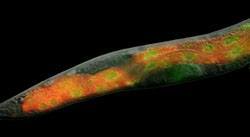Related Topics
Coffee appears to protect against heart failure, skin cancer
Two new studies led by Harvard School of Public Health (HSPH) researchers provide more good news for coffee drinkers. The research links coffee consumption to reduced risk of heart failure and skin cancer. A study led by [[Elizabeth…
Personalized medicine still a long way away, says Cutter Lecture speaker
May 31, 2012 -- Lung cancer makes up only 15 percent of cancer diagnoses, but it is the leading cause of cancer deaths. To help doctors detect the disease in its early, most treatable stages, epidemiologists like Margaret…

New research explores role of genetics in smoking and lung cancer
May 15, 2012 In 2008, three different studies found that certain genetic variants associated with nicotine dependence and smoking were also associated with lung cancer. The findings raised a question: Were the variants linked with lung cancer only…

Franziska Michor honored at second annual Alice Hamilton lecture
May 11, 2012 Franziska Michor, associate professor of computational biology, received Harvard School of Public Health’s second annual Alice Hamilton Award on April 11, 2012 in recognition of her pathbreaking work applying evolutionary theory to cancer. The award,…

TREC center at HSPH tackles obesity, cancer prevention
May 11, 2012 Research has linked obesity with the development and progression of many health problems including multiple forms of cancer. But questions remain about the complex mechanisms by which obesity develops and how it affects cancer risk…

Routine mammograms may result in significant overdiagnosis of invasive breast cancer
Late-Stage Disease Incidence Not Reduced by Screening For immediate release: Monday, April 5, 2012 Boston, MA – New Harvard School of Public Health (HSPH) research suggests that routine mammography screening—long viewed as an essential tool in detecting early…

Cancer patients at increased risk for suicide, cardiac deaths
Patients diagnosed with cancer have an increased risk of suicide and death from heart attack, stroke, or other cardiovascular (CVD) event within weeks of diagnosis, according to a new study by Harvard School of Public Health (HSPH) and…
Examining racial disparities in cancer and mortality rates
March 14, 2012 African Americans face higher cancer rates than whites for many types of cancer, but the reasons why are largely unknown. Epidemiologist Lisa Signorello hopes to help explain the disparities in her role as co-principal investigator…
Red meat consumption linked to increased risk of total, cardiovascular, and cancer mortality
For immediate release: Monday, March 12, 2012 Boston, MA -- A new study from Harvard School of Public Health (HSPH) researchers has found that red meat consumption is associated with an increased risk of total, cardiovascular, and cancer…

Most cancers strike men, but reasons are enigmatic
February 9, 2012 -- It is well known that most cancers strike men more often than women. In many cases these differences can be explained by known risk factors such as smoking, drinking, or occupational hazards. But more than…
